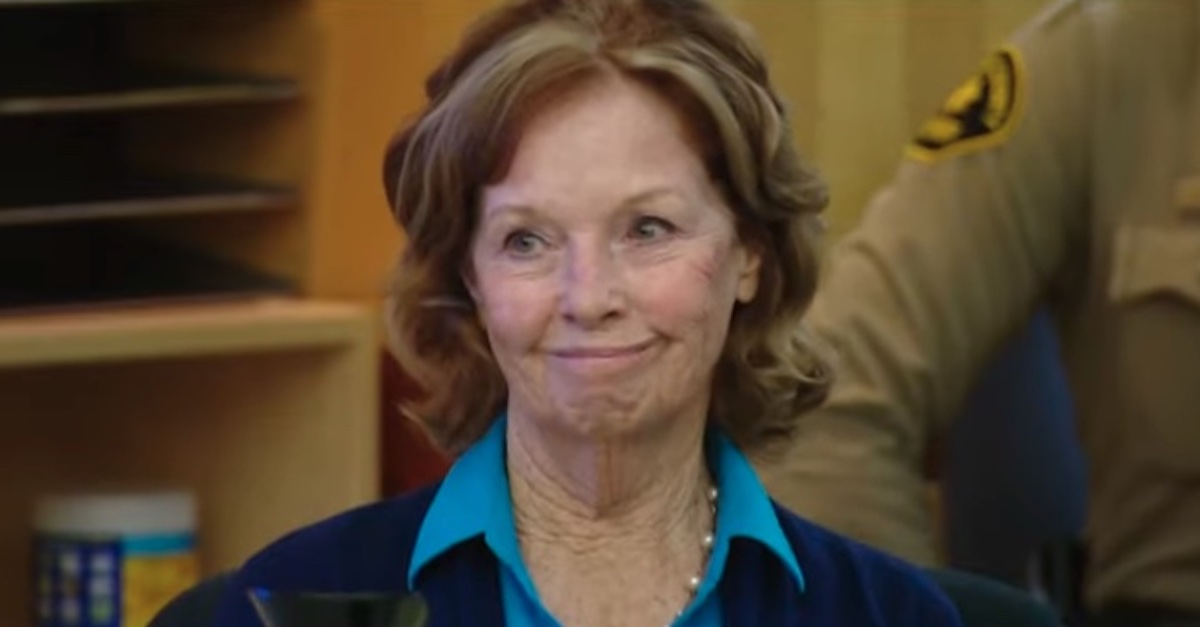
Jane Dorotik smiles after a judge tells her the murder charge against her has been dismissed (via YouTube screengrab/KFMB)
Prosecutors in San Diego have dropped murder charges against a California woman who was facing a second murder trial for the 2000 death of her husband.
Jane Dorotik, now 75, was convicted in 2001 of murdering Robert Dorotik, then 55. According to Dorotik, her husband had gone jogging on Feb. 12, 2000, and never returned home. She reported her husband missing, and his body was found by the side of the road the next morning.
Dorotik was arrested and charged with his murder, with prosecutors alleging she had beat Robert to death and dumped his body by the side of the road. She was convicted in June of 2001.
The conviction appeared to be on solid legal ground: as the District Attorney’s office noted in a court filing, the conviction was affirmed in November 2003 by the California Court of Appeal, and the California Supreme Court denied a petition for review in January of the following year.
Dorotik had served some 20 years of a 25 years-to-life sentence but was released in August of 2019 after filing a petition for habeas corpus. The next year, on July 24, 2020, prosecutors conceded Dorotik’s motion to set aside the guilty verdict, saying in a filing that the DA’s office “believ[ed] the case merited additional examination” due to newly-discovered evidence.
Dorotik’s second trial was on track to start on Monday. Prosecutors, however, changed course after Superior Court Judge Robert Kearney made key pretrial rulings that excluded evidence that was apparently crucial to proving guilt. Those rulings led to the DA’s decision to file a motion to dismiss, which reads more like a capitulation than an acknowledgment of innocence.
“[W]e have concluded we can no longer ethically proceed with the prosecution of this defendant because the evidence is now insufficient to prove guilt beyond a reasonable doubt,” the motion to dismiss said.
The motion noted that as recently as March, Kearney had “found probable cause that Defendant committed the crime of murder of her husband,” and at that time denied Dorotik’s motion to dismiss on due process grounds.
But things appear to have turned in Dorotik’s favor once pretrial hearings got underway starting on May 4.
“After a full and fair hearing, the court determined that key pieces of prosecution evidence were no longer admissible at trial or were only admissible in part due to failed memory and other foundational deficiencies impacted by the passage of more than two decades,” prosecutors wrote in the motion to dismiss. “This is a circumstantial evidence case in which the People’s ability to prove guilt beyond a reasonable doubt depends upon the admission of the full range of evidence.”
Specifically, Kearney had ruled to exclude tire track evidence that prosecutors say links Dorotik to the location where her husband’s body was found. That evidence was allowed at the first jury trial.
Meanwhile, Dorotik’s lawyers have long maintained that certain evidence that was allowed at the first trial should never have been considered.
“The evidence that had been presented at her trial was completely unreliable and did not support the conviction,” lawyers for the Loyola Project for the Innocent (LPI) had said in a statement at the time Dorotik’s original conviction was vacated. That unreliable evidence included “so-called bloodstains presented against Jane at trial were never even tested in a lab and shown to be blood at all,” according to the statement.
On Monday, Kearney—the same judge who had found probable cause that Dorotik had indeed murdered Robert—expressed empathy for the defendant.
“Ms. Dorotik, I know this has been a long and painful journey for you,” Kearney said after granting prosecutors’ request to drop the murder charge. “The only real comfort I can give you at this point is to tell you that this part of your journey is over.”
Dorotik spoke with reporters shortly after the hearing Monday.
“It just is overwhelming to realize that now I can determine my own future,” said Dorotik, who has long maintained her innocence. “It’s something I’ve prayed for and hoped for.”
In an email to Law&Crime, the San Diego County District Attorney’s Office echoed what it said in the motion to dismiss.
“This case has a long history where a jury convicted the defendant of murdering her husband,” spokesperson Tanya Sierra said. “The District Attorney’s Office is ethically bound to only proceed with trial if we believe the admissible evidence is sufficient to convince all twelve jurors that the defendant is guilty beyond a reasonable doubt. After litigating the pre-trial motions in a fair and complete hearing and reviewing the court’s subsequent rulings on admissible evidence and in particular the elimination of key tire track evidence, we have concluded we can no longer ethically proceed with the prosecution of this defendant because the evidence is now insufficient to prove guilt beyond a reasonable doubt.”
“In every criminal case we file, our office remains committed to pursuing fair and equal prosecution and delivering justice for crime victims,” the DA’s office said.
Representatives for Dorotik did not immediately reply to Law&Crime’s requests for comment.
Editor’s note: the writer of this story attended Loyola Law School but has no affiliation with the Loyola Project for the Innocent.
[Image via YouTube screengrab/KFMB.]
Have a tip we should know? [email protected]